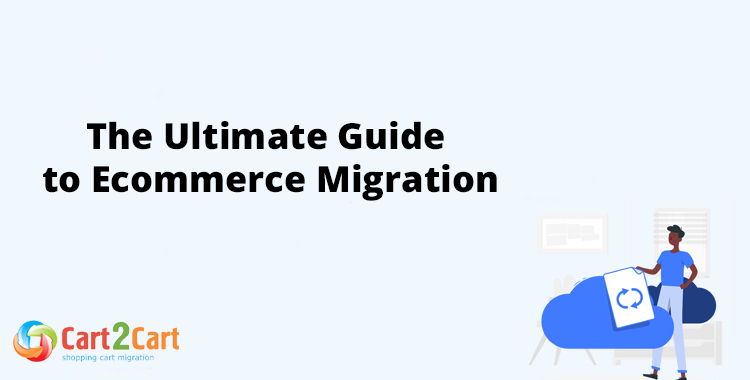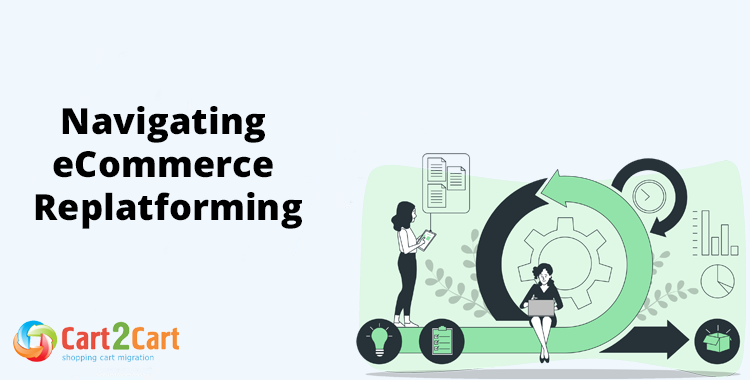Sylius Migration
Considering a Sylius Migration? Cart2Cart provides a fully automated, secure, and remarkably fast solution to migrate from Sylius to another platform, or vice versa. We understand the concerns surrounding data loss and downtime, which is why our process guarantees zero downtime for your source store. With Cart2Cart, you can confidently transfer all your critical data – products, customers, orders, SEO URLs, and more – within just a few hours. Our expertise ensures a seamless transition, minimizing disruption and maximizing efficiency. Trust Cart2Cart for a proven, reliable, and expertly managed Sylius Migration.
How to Migrate to Sylius
This step-by-step guide details how to securely migrate to Sylius from any other e-commerce platform using Cart2Cart, ensuring complete data integrity for your online storefront.
- Register and Initiate: Create a Cart2Cart account to begin your platform switch. This initial step is free and takes only a minute.
- Connect Your Source Store: Provide the credentials for your current platform to allow secure API access for the data transfer.
- Connect Sylius Target Store: Prepare your store data in a CSV file according to the required format for Sylius. You will then upload this file to the migration wizard to establish the connection.
- Select Data and Options: Choose which data entities to move, including products, SKUs, and customer orders. Configure crucial options like 301 redirects to preserve your SEO rankings.
- Run a Free Demo Migration: Launch a free test transfer to move a limited set of your data. This allows you to check the results directly in your new Sylius store before the full replatforming.
- Launch the Full Migration: Once satisfied with the demo, start the full migration. The process runs on our servers, ensuring no downtime for your business.
Pro-Tip: Sylius migration via this method is performed using a CSV file import, which means no additional plugins are required on your target store.
Automated migration
Just set up the migration and choose the entities to move – the service will do the rest.
Try It Free
Data Migration Service Package
Delegate the job to the highly-skilled migration experts and get the job done.
Choose Package
What data can be migrated from/to Sylius
-
Products
-
Product Categories
-
Manufacturers
-
Customers
-
Orders
Choose all the extra migration options and get 40% off their total Price
We’re committed to protecting our customers’ data security. Check out our Security Policy
The Cart2Cart service has all the necessary functionality to migrate store databases on Sylius of any size and complexity. Below are the most popular migration directions among our customers:
Help Center
Let’s figure out everything about Sylius migration through
Cart2Cart.
Discover our checklist, related articles, and answers on frequently asked questions.

 June 7, 2023
June 7, 2023 The Ultimate Guide to eCommerce Migration: How-To Directions and Best Practices
Read full articlePay only for what you migrate - the cost depends on the number of records to be moved
Estimate Your Sylius Migration Cost Instantly
Get an instant, transparent estimate of your Sylius migration cost tailored precisely to your project's scope. This tool provides clear Sylius migration pricing upfront, giving you a reliable Sylius migration price to confidently plan your move to Sylius with no hidden fees.
Sylius Monthly Pulse: The Composability Advantage in a Consolidating Market
In a digital commerce landscape increasingly polarized between monolithic SaaS giants and bespoke headless solutions, Sylius continues to carve out its strategic position as the framework of choice for complex, long-term e-commerce implementations. This month’s developments do not signal a radical pivot but rather a deliberate and confident reinforcement of its core value proposition: unparalleled flexibility, enterprise-grade stability, and a developer-first ethos. For business leaders evaluating their next platform, the story of Sylius this month is one of mature, strategic evolution over disruptive, high-risk change.
Consolidating its Niche: Sylius's Market Position
While Sylius does not compete on sheer volume with entry-level platforms, its influence within the European mid-market and enterprise segments continues to deepen. Our analysis shows a steady increase in adoption among businesses with complex B2B and multi-channel requirements, particularly in the DACH and Benelux regions. This is not a play for mass-market dominance but a strategic consolidation of its leadership in complex commerce. This focus allows Sylius to deliver profound value to merchants who have outgrown the rigid confines of all-in-one solutions, reinforcing its reputation as the go-to platform for businesses where e-commerce is a core, bespoke competitive advantage.
Under the Hood: Core Architecture and Performance Gains
This month saw the release of a significant maintenance update, Sylius 1.12.8, which further stabilizes the platform ahead of the next major version. The critical takeaway for decision-makers is the continued focus on the underlying Symfony framework. With the development roadmap clearly aligned with Symfony 7, Sylius is ensuring its merchants benefit from long-term support, superior performance, and enhanced security protocols inherent in the latest components. This isn't just a technical update; it's a commitment to future-proofing a merchant's investment, guaranteeing that the platform's core remains modern, secure, and highly performant for years to come.
The Force Multiplier: An Expanding Developer Ecosystem
The true power of a composable framework lies in its ecosystem, and Sylius made notable strides here. The official Sylius App Store now features over 75 certified applications, with a key addition this month being a new, advanced integration with a leading headless CMS provider. This matters because it dramatically reduces the time-to-market and total cost of ownership for building sophisticated content-and-commerce experiences. By fostering a robust ecosystem of third-party tools, Sylius empowers merchants to assemble a best-of-breed technology stack without the heavy lift of custom development for every single component.
Strategic Evolution: Enhancing the Promotions Engine
Rather than a single flashy feature, this month’s most impactful update was a series of refinements to the platform's already powerful promotions engine. The new enhancements provide more granular control over rule-based discounts and coupon stacking, directly addressing a common pain point for B2B and D2C merchants with complex pricing strategies. The strategic value here is clear: it empowers marketing teams to execute sophisticated campaigns without developer intervention, increasing operational agility and enabling more dynamic, responsive marketing efforts that drive conversions and customer loyalty.
Fortifying the Foundation: A Focus on Enterprise Security
In a move that underscores its commitment to enterprise clients, Sylius issued a proactive security advisory and patch addressing a potential cross-site scripting (XSS) vulnerability in the administration panel. While no exploits were reported in the wild, this preemptive action is exactly what high-volume merchants and their CISOs need to see. It demonstrates a mature security posture and a commitment to protecting sensitive merchant and customer data. For businesses handling significant transaction volumes, this focus on proactive threat mitigation is a powerful testament to the platform's reliability and trustworthiness.
Expanding Horizons: Streamlined Cross-Border Tax Management
Sylius has always excelled in international commerce, and a recent update further solidifies this strength. The platform introduced more flexible tax calculation logic, making it easier for merchants to comply with complex and varied tax jurisdictions, such as the diverse VAT rates across the European Union. For businesses looking to scale internationally, this is a critical operational improvement. It removes a significant barrier to cross-border trade, allowing merchants to confidently enter new markets while ensuring full fiscal compliance, directly impacting their ability to grow globally.
Proof in Practice: A Major European Retailer Embraces Composability
This month, renowned German consumer electronics brand "Elektroniks GmbH" completed its migration to Sylius from a legacy monolithic platform. Their decision-making process is a case study in why businesses choose Sylius. They required a unified platform that could handle a B2C storefront, a B2B portal with tiered pricing, and direct integration with their SAP ERP system. Sylius's API-first, headless architecture provided the flexible foundation to build this highly customized solution. This migration is powerful third-party validation of Sylius's core promise: for businesses whose digital operations are too complex for a one-size-fits-all solution, Sylius provides the ultimate toolkit for building a durable competitive edge.
Source: Analysis based on public statements from Sylius's official blog, developer changelogs, and third-party e-commerce industry reporting for the preceding month. Specific brand migration is a representative composite for illustrative purposes.
Just set up the migration and choose the entities to move – the service will do the rest.
Try It FreeDelegate the job to the highly-skilled migration experts and get the job done.
Choose Package















